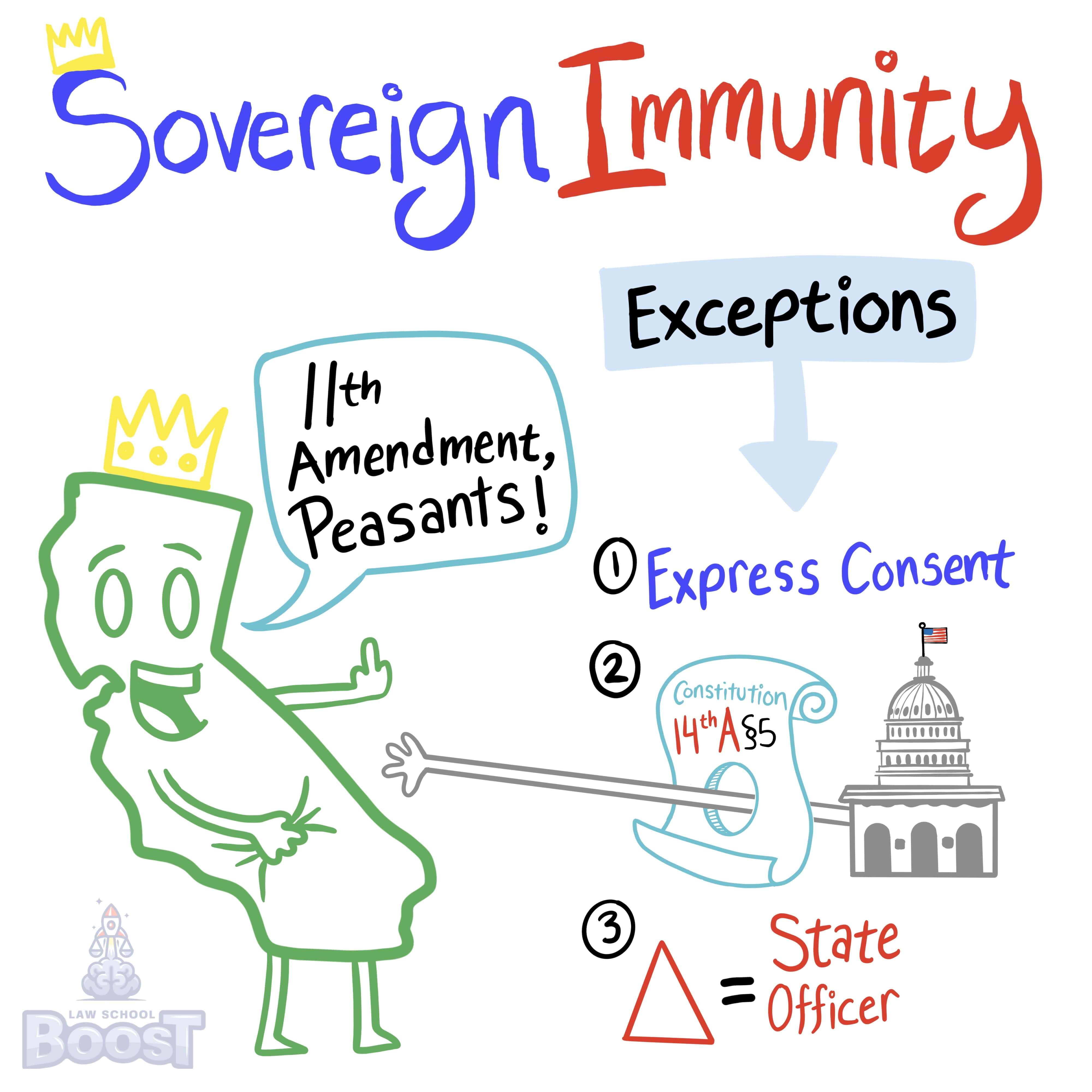🇺🇸
Constitutional Law • Lower Federal Court Review
CONLAW#014
Legal Definition
A state may be sued: (1) if they explicitly waive immunity; (2) pursuant to federal laws adopted under section 5 of the 14th Amendment; or (3) where suit is filed against state officers.
Plain English Explanation
Sovereign immunity prevents states from being sued without their consent. But there are three main exceptions:
First, a state can waive immunity and agree to being sued on something. This is the state "consenting" to suit.
Second, Congress can pass laws under the 14th Amendment that let people sue states, even without state consent. The 14th Amendment was passed after the Civil War to protect rights against state infringement.
Third, people can sue individual state officials for violations instead of suing the state directly. For example, suing the state Attorney General instead of the "State of Hypofornia."
So while sovereign immunity provides strong protection, states don't have total immunity. Through waiver, Congressional action, or suing officials, people can still bring suits for state violations in some cases. The exceptions balance state sovereignty with enforceable rights.
First, a state can waive immunity and agree to being sued on something. This is the state "consenting" to suit.
Second, Congress can pass laws under the 14th Amendment that let people sue states, even without state consent. The 14th Amendment was passed after the Civil War to protect rights against state infringement.
Third, people can sue individual state officials for violations instead of suing the state directly. For example, suing the state Attorney General instead of the "State of Hypofornia."
So while sovereign immunity provides strong protection, states don't have total immunity. Through waiver, Congressional action, or suing officials, people can still bring suits for state violations in some cases. The exceptions balance state sovereignty with enforceable rights.
Hypothetical
Hypo 1: Bob, a state employee in Hypofornia, refuses to issue a marriage license to Sam and Amy because of their backgrounds, even though it's their right under the law. Sam and Amy decide to sue Bob for denying them their rights. Result: Since Bob is a state officer who violated Sam and Amy's rights under the Constitution, Sam and Amy can sue him despite the state's sovereign immunity. This lawsuit is allowed because it targets Bob's actions, not the state directly.
Hypo 2: Hypofornia passes a law that unfairly targets businesses owned by people from New Hypoland, causing Sam's business to suffer. Sam sues Hypofornia, claiming the law violates the 14th Amendment by not treating everyone equally. Result: Sam's lawsuit can proceed because it involves a federal law adopted under section 5 of the 14th Amendment, aiming to protect against unfair state actions.
Hypo 3: After being injured by a poorly maintained state-owned facility in Hypofornia, Bob tries to sue the state for his injuries. However, Hypofornia has not waived its immunity in this case. Result: Bob cannot sue Hypofornia because the state has not explicitly waived its immunity for this type of lawsuit.
Hypo 4: Hypofornia publicly announces that it will allow itself to be sued for any negligence at state-operated hospitals. Sam, after receiving poor treatment at such a hospital, decides to sue the state. Result: Sam can sue Hypofornia because the state explicitly waived its immunity in cases involving state-operated hospitals.
Hypo 2: Hypofornia passes a law that unfairly targets businesses owned by people from New Hypoland, causing Sam's business to suffer. Sam sues Hypofornia, claiming the law violates the 14th Amendment by not treating everyone equally. Result: Sam's lawsuit can proceed because it involves a federal law adopted under section 5 of the 14th Amendment, aiming to protect against unfair state actions.
Hypo 3: After being injured by a poorly maintained state-owned facility in Hypofornia, Bob tries to sue the state for his injuries. However, Hypofornia has not waived its immunity in this case. Result: Bob cannot sue Hypofornia because the state has not explicitly waived its immunity for this type of lawsuit.
Hypo 4: Hypofornia publicly announces that it will allow itself to be sued for any negligence at state-operated hospitals. Sam, after receiving poor treatment at such a hospital, decides to sue the state. Result: Sam can sue Hypofornia because the state explicitly waived its immunity in cases involving state-operated hospitals.
Visual Aids



